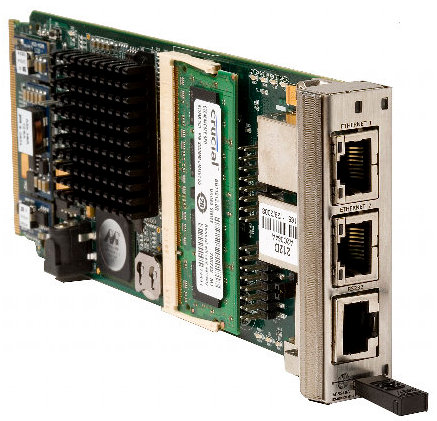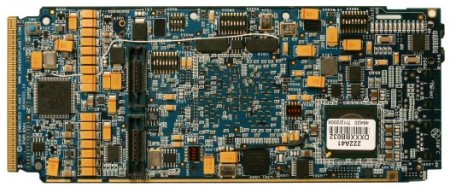Carrier-grade boards boast Scope compliance
May 23, 2008 — by Eric Brown — from the LinuxDevices Archive — 7 views Embedded Planet is shipping two carrier-grade telecom boards with Linux board support packages (BSPs). Based on Freescale PowerPC systems-on-chips (SoCs), the boards are among the first to boast compliance with the Scope Alliance's AMC-1 (Advanced Mezzanine Card) profile.
Embedded Planet is shipping two carrier-grade telecom boards with Linux board support packages (BSPs). Based on Freescale PowerPC systems-on-chips (SoCs), the boards are among the first to boast compliance with the Scope Alliance's AMC-1 (Advanced Mezzanine Card) profile.
(Click for larger view of the EP8641A)
Embedded Planet's EP8548A and EP8641A boards are targeted at applications including wireless base stations, media gateways, network access systems, test and measurement systems, and server blades. Board costs and power consumption have been reduced, says Embedded Planet, because the Freescale SoCs used on both boards provide integrated security engines and DDR2 memory interfaces, as well as PCI Express, Serial RapidIO, and Gigabit Ethernet controllers. Both boards adhere to the single-width, full-height AMC format.
The high-end EP8641A (pictured above and farther below) uses the Freescale MPC8641D dual-core PowerPC at 1.5GHz. It supports up to 1GB of DDR2 RAM, in two independent 512MB banks, one allocated to each core.
The more affordable, RoHS-compatible EP8548A (pictured directly below) is equipped with a Freescale MPC8548 PowerQUICC III processor clocked at 1.33GHz. It offers support for up to 2GB of RAM with up to 128MB of flash for boot code or local storage.

EP8548A
Otherwise, the boards are similar, and come in a variety of configurations. All versions of the boards support gigabit Ethernet on AMC channels 0 and 1, compliant with AMC.2, Type E2. Separate versions of each board are available in one of the following configurations:
- Serial RapidIO on AMC channels 4-7
- PCI Express on AMC channels 4-11
- Scope-compliant PCI Express on channels 4-7 and Serial RapidIO on channels 8-11
Both EP8548A and EP8641A include dual gigabit Ethernet connections to the front panel, and offer a front-panel serial port. The power supply is via an AMC connector per AMC.0, or from the barrel connector when in standalone mode. They both offer JTAG/COP debugging via an onboard connector, and available on the AMC connector.

Flip side of the EP8641A
(Click to enlarge)
Both AMC boards are available with Linux BSPs, with source code and a toolchain from Denx Software's Embedded Linux Development Kit (ELDK). The kernel source (both 2.4 and 2.6 versions) is a modified version of the canonical Linux kernel hosted by Bitkeeper, says Embedded Planet. The packages are said to contain prebuilt RAM and ROM kernel images and documentation. In addition, the boards can be configured to support Wind River VxWorks and Green Hills Integrity.
The two boards appear to be among the first Linux-compatible AMC boards to promote their compliance with the AdvancedMC Hardware Profile, version 1.0 (AMC-1) profile created by the Scope Alliance. The group was founded in January 2006, by Alcatel, Ericsson, Motorola, NEC, Nokia, and Siemens. Today it boasts over two dozen members, including Wind River, MontaVista, Enea, Intel, RedHat, and VirtualLogix. Scope maintains about half a dozen “profiles,” most aimed at clarifying and cross-integrating standards published by other groups — the Linux Foundation Carrier Grade Linux standard, for example. The group also provides “gap analysis,” with the aim of helping standards bodies learn where implementers found their work incomplete or the technology they specify to be inadequate.
Stated Mark Lowdermilk, president of Embedded Planet, “These market-leading solutions give design engineers the option to use PCIe-only, Serial RapidIO (SRIO)-only, or SCOPE compliant PCIe and SRIO.”
Stated Ernie Bergstrom Crystal Cube Consulting's VP Research, “In addition to their AMC configuration, both boards can operate as stand-alone modules and boot from on board flash allowing for rapid application development outside of the integrated ATCA or MicroTCA environment.”
Availability
The EP8548A and EP8641A are available immediately, says Embedded Planet with prices starting at $2,700 and $5,000 respectively. More information on the EP8548A may be available here, and more on the EP8641A should be here. More on the Linux BSPs can be found here.
This article was originally published on LinuxDevices.com and has been donated to the open source community by QuinStreet Inc. Please visit LinuxToday.com for up-to-date news and articles about Linux and open source.